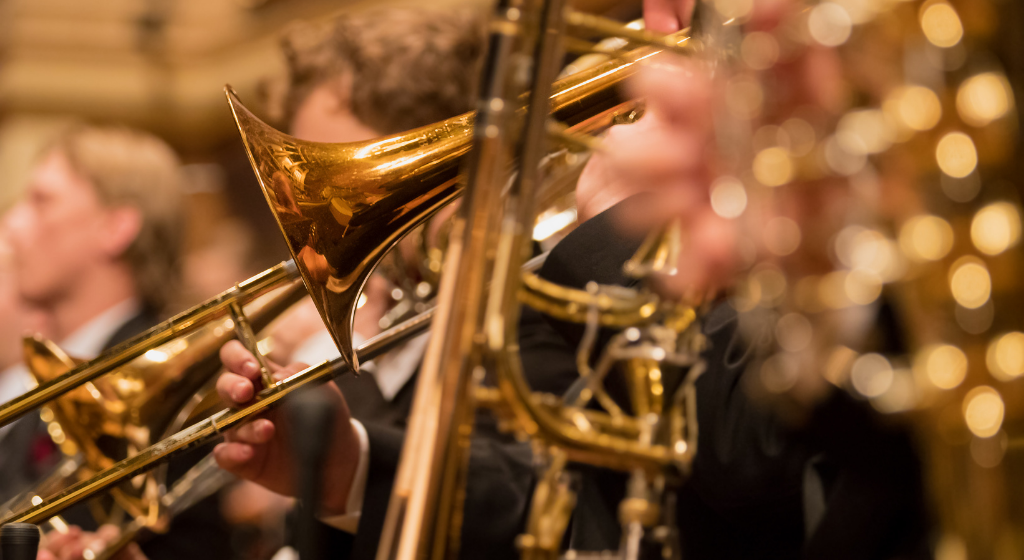You probably know it too, when the day was too stressful and the first thing you do after coming home is put your favorite playlist on to relax. Or when even if not everyone likes to admit it, it always gives you goosebumps when you hear Whitney singing "I will always love you". Or when, at the end of the year, "Last Christmas" by Wham plays on the radio for the first time - some people can’t stand it and others get this warm feel-good feeling. There are certainly numerous other examples, but it quickly becomes clear that music is a powerful tool when it comes to evoking emotions in us. This realization is not new. Places, where this effect is definitely heavily implemented, are the major Hollywood studios. They have perfected this art of touching people in their innermost being by combining images and music. Music also has great significance outside the entertainment industry, for example, when it comes to helping people. Music therapy is extremely successful in reducing negative emotions, lowering anxiety, physical and emotional pain, influencing muscle tension, high blood pressure, and stress hormones.
The LUMEUS app helps with the use of the Herzog method
In our LUMEUS app, we use this influence that music has on our feelings, together with spoken visualizations, to evoke emotions that can change our behavior in the long term. Our training program is based on the Herzog Method and the music you hear is film music written especially for the trainings by the composer David Christiansen and was recorded together with the Budapest and Berlin Symphony Orchestras.
„Ich denke, es ist ein sehr starkes Projekt, ich hatte die Sprachaufnahmen schon einmal gehört und fand sie so intensiv, dass ich Musik dazu machen wollte. Ich hatte das Gefühl, dass, wann immer ich Musikern von diesem Projekt erzählte, sie es alle verstanden und sich sehr gut damit identifizieren konnten, da sie alle ein Familienmitglied, ein Kind oder einen Freund haben, das/der vielleicht einige emotionale Schwierigkeiten erlebt hat. “
But what exactly is behind the power of music that can give us beautiful moments and alleviate bad ones in equal measure?
We talked to David Christiansen about this and summarized the key findings of the current research for you.
The theory behind the art: what science knows about the effect of music
Fast alle Theorien über musikalische Kompositionen und ihre Interpretation betonen die Bedeutung der Musik als unersetzliches Medium im Prozess der Kommunikation von Gefühlen und Emotionen. Bob Marley sang in dem Lied „Trenchtown Rock“: Das Gute an der Musik ist, dass man, wenn sie einen trifft, keinen Schmerz spürt. Es gibt Studien, die direkt von der positiven Wirkung der Musik auf den menschlichen Körper und seine Entwicklung sprechen! Und das gilt für alle Lebensabschnitte eines Menschen. Musik hat sowohl geistige als auch körperliche Auswirkungen auf den Körper und kann dazu beitragen, das allgemeine Wohlbefinden zu steigern. Vom Stressabbau über die Verbesserung der kognitiven Leistungsfähigkeit bis hin zur Förderung und Inspiration der Kreativität – die Kraft der Musik ist wirklich erstaunlich. Forscher der Stanford University fanden sogar heraus, dass Musik die Gehirnfunktion „in vielen Fällen in gleichem Maße wie Medikamente“ beeinflussen kann.
Ich glaube, dass Musik in uns so gut Gefühle hervorruft, weil das Hören der erste Sinn ist, den wir entwickeln. Noch bevor wir geboren werden, ist es das erste, was wir erfahren, wir sehen oder verstehen die Welt nicht, aber wir hören sie um uns herum.
– David Christiansen
Music appears in our lives earlier than language.
Music appears in our lives earlier than speech. Children already react to environmental sounds in the prenatal period. From the earliest moments of life, babies respond not only to their mother's singing but also to other sounds from the world around them.
In 2013, researchers at Beth Israel Medical Center in Boston studied a group of 272 premature babies born at 11 different hospitals. The researchers subjected them to a special kind of music therapy. They chose sounds resembling the sounds in the womb such as heartbeat and ocean noise. These ranged from music based on percussion instruments to lullabies sung by medical staff and the toddlers' parents.
The music therapists also chose music to match the baby's heart rate and breathing rhythm. The results of the study were surprising - the babies were calmer, slept better, and were less stressed, which also had a positive effect on their parents.
By recognizing our emotions we find ourselves
Mehr als andere Künste dringt die Musik in die Tiefen der menschlichen Psyche ein. Sie beeinflusst den Rezipienten, noch bevor er in der Lage ist, sie zu verstehen und das musikalische Werk als einen Gegenstand von künstlerischem Wert wahrzunehmen. Der Klang überträgt eine Fülle von Gefühlen und Stimmungen, die den Hörer in bestimmte Zustände versetzen, die er als freudig, erhaben oder sentimental empfindet. Wenn uns die Worte fehlen, um unsere Emotionen, Gefühle und Erfahrungen zu beschreiben, kommt uns die Musik zu Hilfe, denn sie ist in der Lage, das „Unbeschreibliche“ zu „beschreiben“, unsere Sehnsucht, Freude, unseren Schmerz, unsere Erregung auszudrücken.
“I think the moment of composing is very special to me, it’s like a dialog with myself. I love to write music for orchestra and record with real-life musicians. I create something and people give the energy and life into it. “
– David Christiansen


It is often said that music is the language of emotions, that music expresses emotions. It is also noted that emotion is one of the basic contents of music because it expresses what touches and moves a person.
The emotions induced by music are sometimes referred to as refined emotions because self-reflection and self-awareness play a determinant role in them. Despite the fact that they are not connected to the basic life goals of a human being, they are equally important. Musical emotions, but also the music itself, help in forming one's own identity, creating one's own self, defining one's place in the peer group.
Music not only has an effect that shapes the imagination but also influences emotional development and - which is related to this - plays a large role in the process of socialization and development of interpersonal bonds.
For example, Some people can't stand crowds and even in a store they can get a little nervous and tired, but when it comes to a concert by their favorite band it doesn't matter. They just go and hope to have a good time with all the other fans.
Music and our memory: a journey into our own past
Einer der Hauptgründe, warum Menschen Music hören, ist, dass sie damit eine emotionale Erfahrung machen. Nach Ansicht von Forschern ist das, was uns in der Musik bewegt, das, was wir als aufrichtig, aber auch als irgendwie nahe an uns wahrnehmen. Sicherlich können Reaktionen auf Musik sehr stark sein, weil sie echt, natürlich, ungezwungen und ohne Maskierung sind. Die Music wird zu einem Feld, das es uns ermöglicht, wir selbst zu sein, und vollständig zu offenbaren, ohne der Lächerlichkeit oder der heute verpönten Sensibilität ausgesetzt zu sein.
“I traveled a lot for a while and during that time I didn’t listen to music for a while(just on the radio). I realized, I felt low and bad and I didn’t know why. Then I bought a CD player and instantly felt better, happier, it was a feeling like I was coming home after a long time of absence.”
– David Christiansen
Sometimes a certain piece of music is associated with a specific situation that a person has experienced in his or her life. Music very often evokes memories, especially when certain music has been repeatedly played in the past in conjunction with another stimulus that was emotionally charged. As a result of this process, through the formation of a conditioned reflex, listening to specific music automatically elicits positive or negative feelings associated with the affective stimulus, even without the occurrence of that stimulus. Specific music can evoke positive emotions, e.g. when it has been listened to repeatedly in the past during pleasant social gatherings, and negative emotions when it has accompanied stressful work situations.
Musik wirkt hier als so genannter Context Cue: Indem sie ein bestimmtes Ereignis aus unserem Gedächtnis abruft, ruft sie eine bestimmte Stimmung in uns hervor, so wie das Rauschen des Meeres angenehme Urlaubserinnerungen hervorruft. Im Erwachsenenalter sehnen wir uns oft nach Music, die wir als „unsere“ Musik bezeichnen, d. h. in der Regel nach Musik, die wir in der Jugendzeit gehört haben. Die Adoleszenz ist die Phase, in der wir besonders intensive Emotionen erleben, und daher ist die von Emotionen geprägte Musikrezeption besonders langlebig. Das Auftreten einer eigentümlichen Nostalgie für die Vergangenheit und ihre Idealisierung ist hier sicherlich von erheblicher Bedeutung.
Music, a language of the whole world
Research around the world, both in medicine and psychology and in the last few decades in music therapy, demonstrates that appropriately selected music elicits specific emotional responses. These studies usually describe changes in a person's mood during musical activity, when playing or listening to songs. The most common are relaxation, calming or excitement, motivation, or changes in mood.
Emotional responses to music reception occur equally in both musically educated and musically uneducated individuals. The discovery that emotions can be recognized even in music from very distant cultural backgrounds says a great deal about the universality of emotional experience. Often emotions are aroused by a piece of music that one has never heard before, so there is no question of recalling a memory.
A recent cross-cultural study showed that members of the African Mafa tribe, who had no previous contact with European culture, recognized joy, sadness, and fear in European music. This means that the recognition or arousal of emotions by music cannot be explained by the knowledge of cultural convention - that is, the fact that certain sounds or musical fragments usually appear in a given context. In every culture, people experience strong emotions when they engage with music, which demonstrates the cross-cultural universality of music. These experiences are powerful, meaningful, and motivating for further action.
Awareness of the arousal of feelings resulting from musical experiences allows people to project their own emotions and moods, arousing emotions that are pleasant (positive) or unpleasant (negative). Emotions aroused through contact with music are of short duration, they are not strictly synchronized with the stimulus (the piece of music), but they are intense and memorable for a long time. Moreover, everyone can experience musical emotions subjectively, which are not subject to objective evaluation


Music gets into the nerves, into the blood, and goes to the head
The main physiological manifestation of music's effect on mood is the activation of the autonomic nervous system. Music evokes emotions that are activated by its rhythm and tempo. This affects the level of arousal a person experiences. Therefore, it is not said that only energetic music will put us into ecstasy. Any music is able to improve our mood as long as the brain perceives it as beautiful, harmonious, and soothing. Music affects the production of epinephrine, norepinephrine, serotonin, dopamine (Panksepp and Bernatzky, 2002), which have a significant impact on our mood. Researchers claim that there are special structures in the brain responsible for the perception of music and its meaning. In turn, the emotional response to it is the result of the interaction of many areas. The centers of interest, emotion, reward, and motivation are involved. We are different as people, hence the different reactions of each of us to music, the different tastes of listeners.
Contact with appropriately selected music can therefore contribute to the reduction of physical and emotional tension. It should be added that the relaxing nature of songs is usually associated with such features of the musical structure as a slow tempo, simple, repetitive melodic patterns, harmony, and rhythmicity. However, the results of some studies indicate that music in accordance with the listener's preferences may be useful for lowering stress levels even if it does not have a typically calming character. The effect of music on the physiological and emotional processes of the listener is determined not only by the structure of the piece of music but also by the individual characteristics and the current mental and somatic state of the listener. Such variables as, for example, personality, musical preferences, current mood, and physical well-being, personal memories and connotations of the listener associated with a particular piece of music, and many others are relevant here. Therefore, reactions to music are not always easy to predict - the same piece of music may make some listeners feel better, while others feel worse.
In summary, the importance of music to life has probably always been evident and will always be part of our lives in a very complex way.
Our conclusion: music: catches your ear, stays in your head and helps body and mind.: Musik: Geht ins Ohr, bleibt im Kopf und hilft Körper und Geist.
Related articles
Weight gain starts in the head
13 April 2023
The easy availability of food has resulted in an increase in obesity in the world population among adults and children for read more


Weight gain starts in the head
23 February 2023
The easy availability of food has resulted in an increase in obesity in the world population among adults and children for s read more


7 methods against Unproductivity in the home office
19 May 2022
While it was already everyday life for some people, many people had to adapt to working from home, especially at the beginning of Corona. Some did read more


